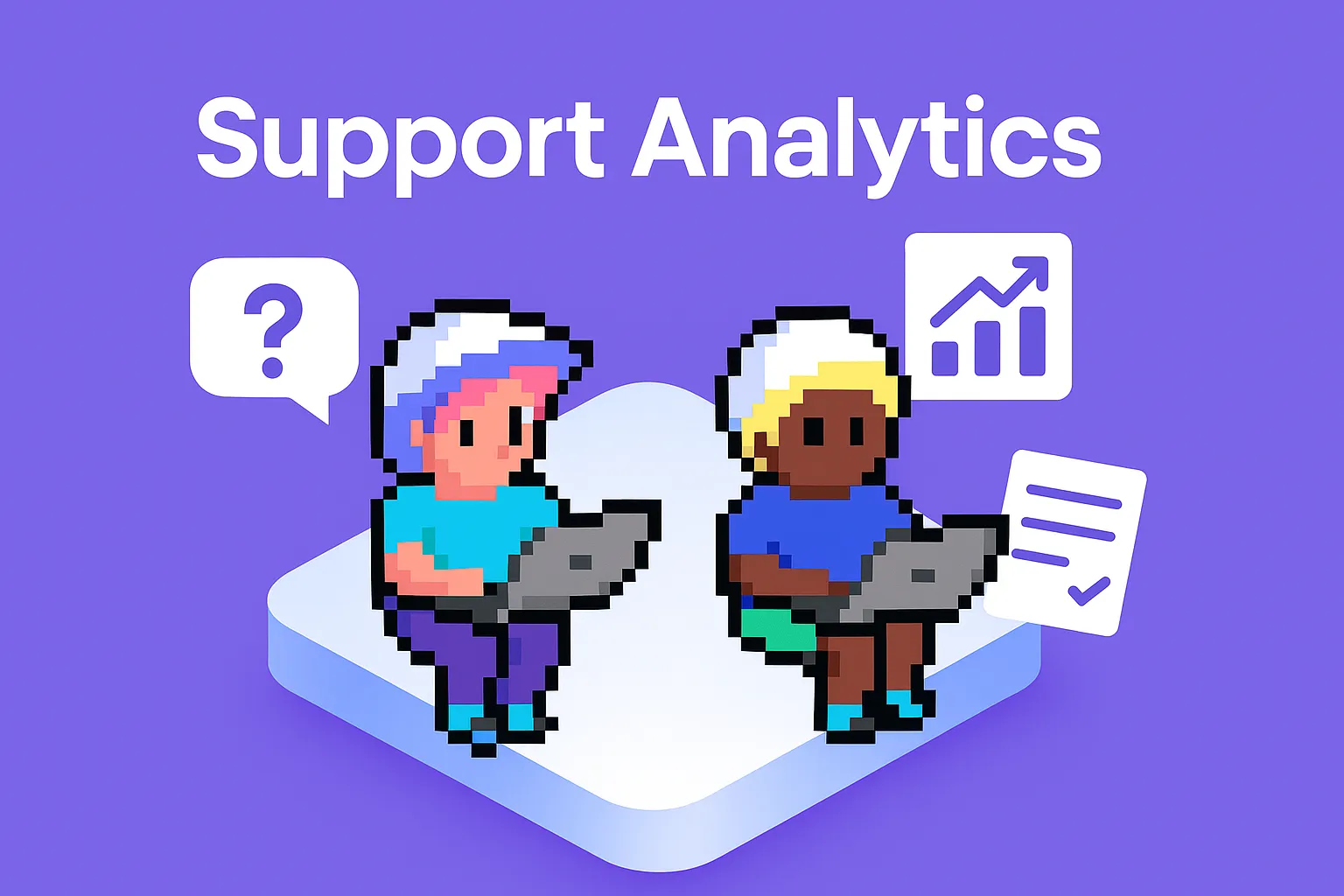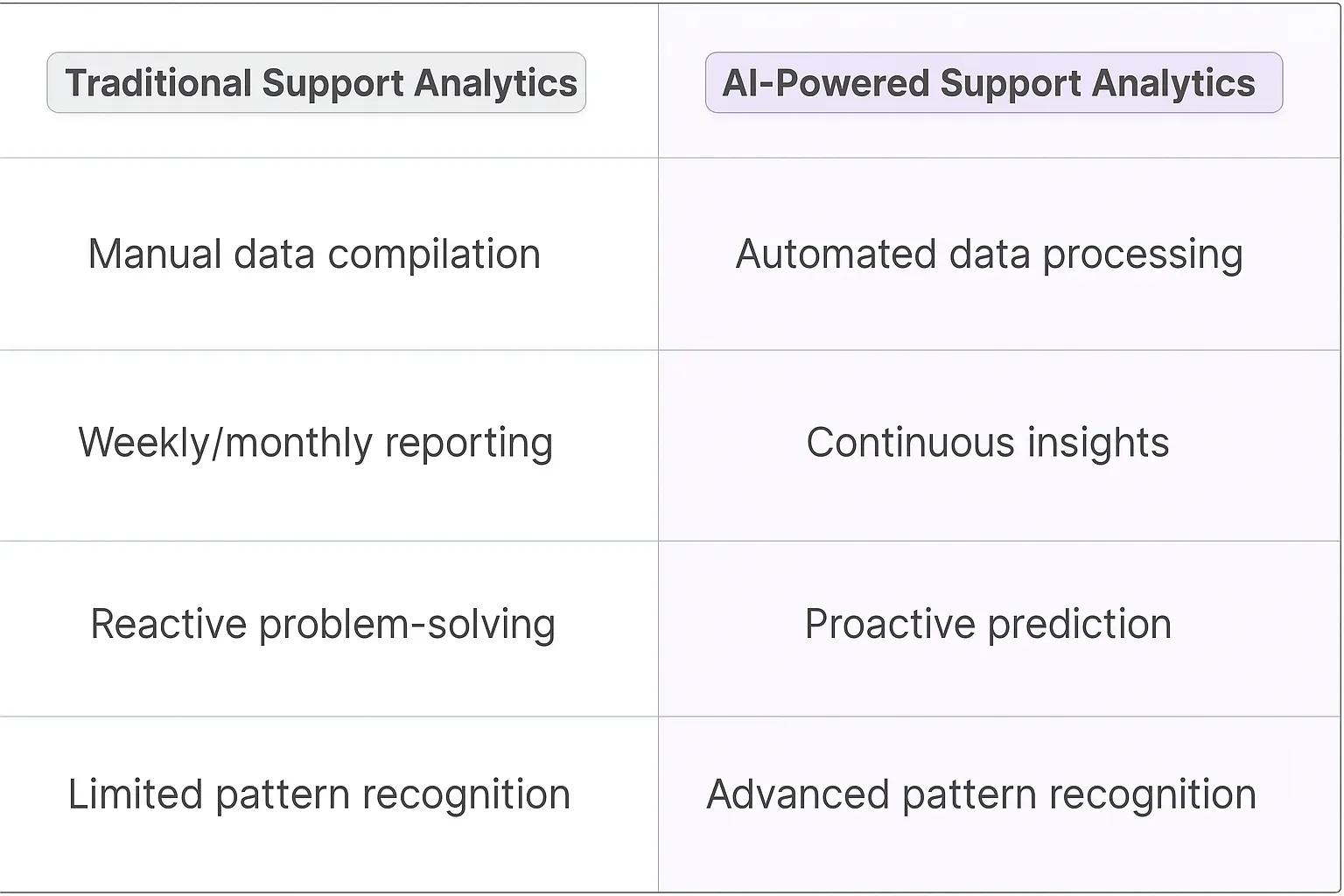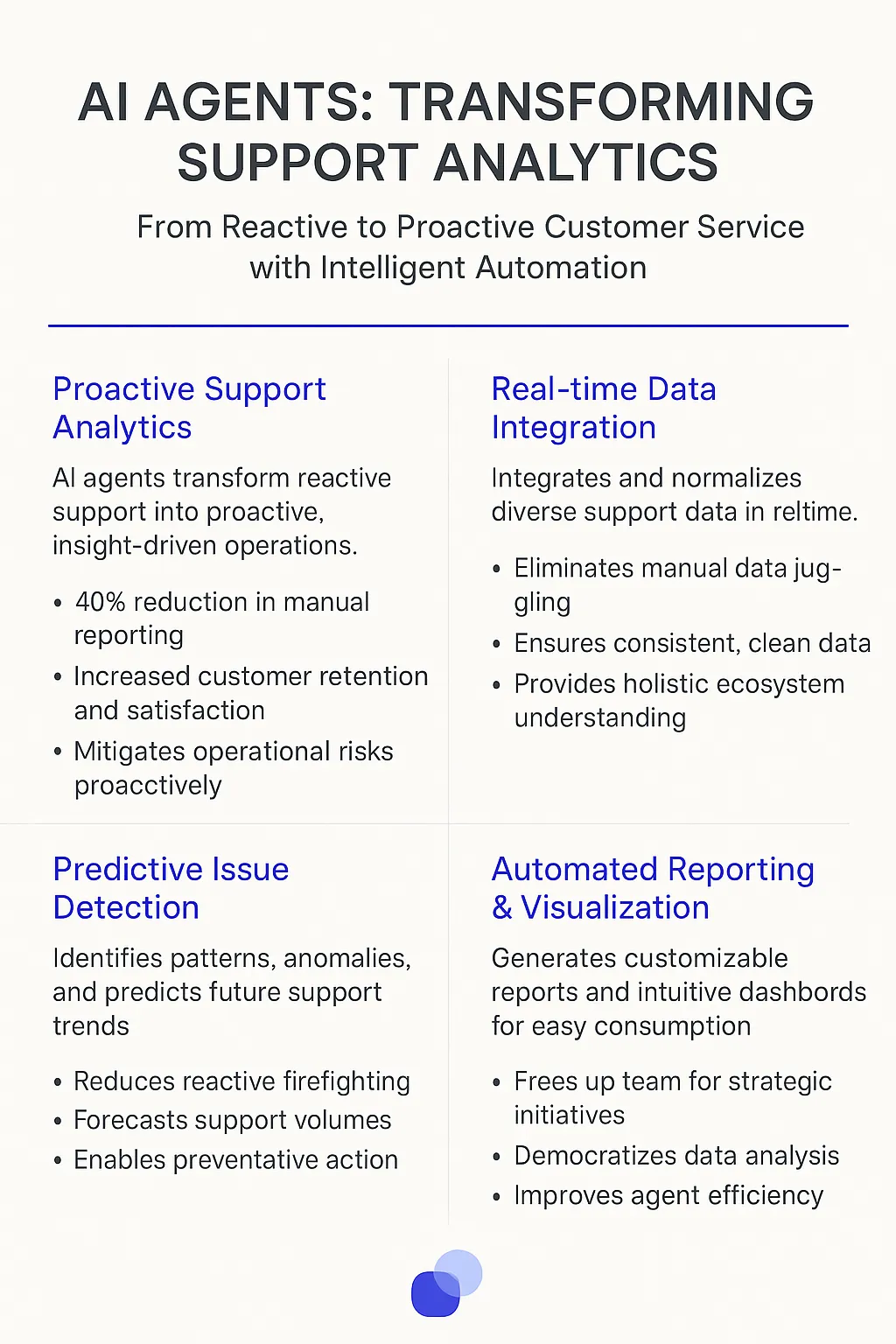Support Analytics Manager is a data analytics platform that leverages AI Agents to process and analyze customer support interactions at scale. The platform connects with existing support tools to provide real-time insights, predictive analytics, and automated reporting capabilities. By continuously analyzing support metrics, customer sentiment, and ticket patterns, it enables support teams to identify trends and make informed decisions about resource allocation and process improvements.

Support teams traditionally relied on a complex stack of manual processes and disconnected tools. They'd spend hours digging through spreadsheets, juggling multiple dashboards, and manually compiling reports. The reality was endless context-switching between tools, copying and pasting data, and trying to make sense of support metrics across different platforms. Support managers often became Excel power users by necessity, not choice.
The integration of AI Agents into Support Analytics Manager creates a fundamental shift in how support teams operate. These digital teammates handle the heavy lifting of data analysis, working 24/7 to surface meaningful insights that would take humans days or weeks to uncover.
The most compelling benefit is the ability to identify patterns in customer issues before they become widespread problems. AI Agents continuously analyze ticket data, customer sentiment, and resolution times, flagging potential bottlenecks or emerging trends that might impact customer satisfaction.
For support managers, this means moving from reactive to proactive decision-making. Instead of spending Monday mornings building reports, they can start their week with AI-generated insights about team performance, customer satisfaction trends, and specific areas needing attention.
The network effects are particularly interesting - as these AI Agents process more support data, they become increasingly accurate at predicting which types of issues might spike during certain periods, allowing teams to staff appropriately and prepare relevant documentation in advance.
From a growth perspective, support teams using AI Agents report up to 40% reduction in time spent on reporting and analytics tasks. This translates to more time spent on strategic initiatives like knowledge base improvements and team coaching - activities that directly impact customer satisfaction and retention.
The real game-changer is how AI Agents democratize data analysis across support organizations. Junior team members can now access sophisticated insights without needing advanced analytical skills, creating a more data-driven culture from the ground up.

Support analytics is fundamentally a compounding game. When you deploy AI agents to analyze support data, you're not just getting insights - you're building a flywheel that gets stronger with every customer interaction.
The most successful support teams I've worked with treat analytics as a core driver of their support strategy, not just a reporting function. They use AI agents to surface patterns that humans might miss - like subtle correlations between product usage and support volume, or early warning signs of emerging issues.
What makes support analytics agents particularly powerful is their ability to close the loop between insight and action. They don't just tell you what happened - they help predict what's likely to happen next and suggest specific interventions to improve outcomes.
The key is focusing these digital teammates on high-leverage activities that directly impact customer satisfaction and team efficiency. When deployed thoughtfully, they become an essential part of the support infrastructure, continuously learning and adapting to help teams deliver better service at scale.

Support Analytics Manager AI agents are transforming how companies understand and act on their customer service data. Drawing from my experience working with growth-stage startups, I've observed these digital teammates becoming essential for extracting actionable insights from support interactions.
The real power lies in how these AI agents adapt to different business contexts. A SaaS company might deploy them to analyze churn risk patterns in support tickets, while an e-commerce business could use them to identify product issues before they become widespread problems. The key differentiator is their ability to process vast amounts of support data and surface insights that would take human analysts weeks to uncover.
What's particularly fascinating is how these AI agents have evolved beyond basic ticket categorization. They now identify subtle patterns in customer sentiment, flag emerging technical issues, and even predict which customers might need proactive outreach based on their support history. This level of analytical sophistication wasn't possible even a few years ago.
The applications across industries are both diverse and deeply impactful, fundamentally changing how organizations understand and respond to customer needs through their support channels.
When I worked with early-stage startups, one pattern became crystal clear: support analytics often held the key to product-market fit. A Support Analytics Manager AI Agent transforms how e-commerce companies handle their customer feedback loops, and I've seen this play out particularly well in the direct-to-consumer (DTC) space.
Take the case of a growing skincare brand dealing with 50,000+ monthly customer interactions. Their support team was drowning in data but struggling to extract meaningful insights. The Support Analytics Manager AI Agent began analyzing conversation patterns across their support channels, uncovering that 47% of customer queries centered around product combinations - something their marketing team hadn't considered.
The AI Agent identified three critical patterns:
By automatically categorizing these insights and generating weekly trend reports, the AI Agent helped the brand develop targeted content strategies. They created seasonal skincare guides, product pairing charts, and video tutorials - all based on actual customer pain points.
The results? A 34% reduction in repeat queries, 28% increase in first-purchase conversion rates, and most importantly, a product roadmap that actually reflected customer needs. The support team transformed from a cost center into a strategic asset, driving product development and marketing decisions.
This shift from reactive support to proactive insight generation represents the next evolution in customer experience. Support Analytics Manager AI Agents don't just count tickets - they uncover the stories behind the numbers, helping brands build better products and stronger customer relationships.
During my time investing in B2B software companies, I've noticed a fascinating trend: the most successful products often emerge from deep support analytics. A recent example from a developer tools company demonstrates how Support Analytics Manager AI Agents can transform user frustrations into product breakthroughs.
This particular company provided API management tools to over 10,000 developers. Their support team handled roughly 30,000 monthly interactions, but they were missing crucial patterns in their users' struggles. Enter their Support Analytics Manager AI Agent, which began dissecting their support conversations with surgical precision.
The AI Agent uncovered several non-obvious patterns:
What makes this case fascinating is how the AI Agent connected seemingly unrelated support threads. It identified that developers who struggled with authentication were also likely to have issues with webhook implementations three weeks later - a correlation human analysts had missed entirely.
The company leveraged these insights to rebuild their onboarding experience. They created framework-specific integration guides, automated configuration checks, and predictive support interventions. The AI Agent didn't just analyze problems - it mapped the entire developer journey through the lens of support interactions.
The metrics tell a compelling story: Time-to-integration dropped by 41%, user churn decreased by 23%, and most notably, their Net Promoter Score jumped from 32 to 58. But the real win came from product development - they built three new features directly addressing pain points identified through support analytics, all of which became top revenue generators.
This exemplifies the network effects of intelligent support analytics - better insights lead to better products, which attract more users, generating more insights. It's a virtuous cycle that transforms support from a reactive function into a strategic advantage.
Implementing a Support Analytics Manager AI agent requires careful planning and awareness of several key challenges. The complexity goes beyond simple deployment - it's about creating a system that genuinely enhances your support operations while maintaining data integrity and team dynamics.
Data integration poses the first major hurdle. Your support analytics agent needs clean, consistent data from multiple sources - ticket systems, chat logs, customer feedback, and CRM platforms. Many organizations struggle with fragmented data structures and inconsistent formatting across these systems.
Real-time processing capabilities present another technical challenge. The agent must analyze incoming support data quickly enough to provide actionable insights, but not every organization has the infrastructure to handle this computational load. Legacy systems often create bottlenecks that slow down analysis and reduce the agent's effectiveness.
Support teams may resist adopting AI analytics tools due to concerns about job security or skepticism about AI accuracy. Building trust requires transparent communication about how the agent augments rather than replaces human expertise.
Training the AI agent on company-specific metrics and KPIs demands significant initial investment. Each support organization has unique definitions of success, customer satisfaction benchmarks, and resolution time targets. The agent needs extensive training data to understand these nuances.
Customer data privacy becomes more complex with AI analysis. The agent needs robust security protocols to handle sensitive information while complying with regulations like GDPR and CCPA. Organizations must implement strict data access controls and audit trails.
Support teams often have established processes that work well. The analytics agent should enhance these workflows without disrupting them. This requires careful API integrations, customizable alert thresholds, and flexible reporting options that match existing team structures.
Success depends on finding the right balance between automation and human oversight. The agent should provide insights that inform decision-making while leaving strategic choices to experienced support managers.
Support Analytics Manager represents a significant evolution in how support teams leverage data and AI to improve customer experience. The platform's AI Agents create a multiplier effect - each insight they uncover leads to better decision-making, more efficient processes, and ultimately, happier customers. While implementing these digital teammates requires careful consideration of technical and operational factors, the benefits far outweigh the initial investment. Support teams that embrace this technology gain a significant competitive advantage through deeper insights, proactive problem-solving, and more strategic resource allocation. The future of support analytics isn't just about collecting data - it's about turning that data into actionable intelligence that drives business growth.